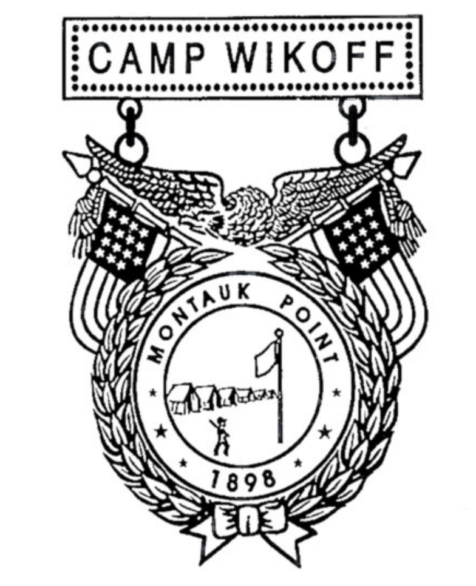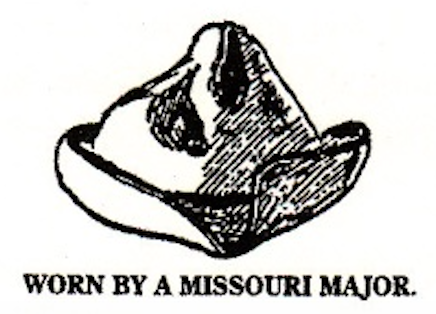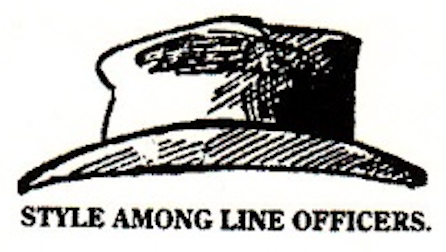Self-Guided
BIKE TOUR OF HISTORIC
CAMP WIKOFF
Montauk, New York / 1898
~~~~~~~~~~~~~~~~~~~~~~~~~~~~~~~~~
CAMP WIKOFF Intro
Gen. Shafter’s Fifth Army Corps defeated Spanish forces at Santiago de Cuba in July, 1898, helping bring the Spanish-American War & the Spanish Empire to an end.
22,500 soldiers — returned home at Fort Pond Bay, following a 7-day voyage on transports from Santiago de Cuba. More than half suffered from tropical fevers, mainly malaria, but also yellow fever, typhoid & dysentery, as well as malnutrition. In addition, 7,000 soldiers from southern posts, who had not seen action in Cuba, arrived by train, many of those suffering from tropical fevers contracted in the southern camps.
First troops — Sixth United States Cavalry — arrived by train on August 8th & the last regiment — Seventh United States Infantry — left by train, assigned to a western post, on October 9th, effectively bringing Camp Wikoff to a close.
______________________________________________
~~~~~~~~~~~~~~~~~~~~~~~~~~~~~~~~~
LET’S GO!
MONTAUK STATION EAST to THIRD HOUSE
~~~~~~~~~~~~~~~
Site # 1: Montauk Station
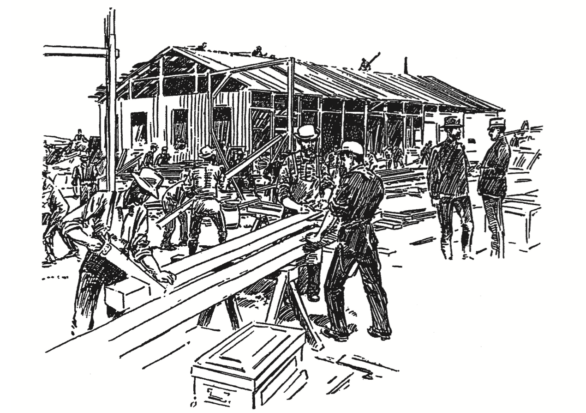
A Village Street — built at Montauk Station for Camp Wikoff:
- General Store
- Post Office
- Officers’ Club
- Printing Building
- Express Building
- Powerhouse | Tesla / Westinghouse
- Restaurant.
BULLY! page 34 / New York Herald.
Montauk Train Station was built in 1895.
——————————
The long railway platform swarmed with passengers just in from the train and mingling with crowds of soldiers in their blue and brown uniforms. A pandemonium of sounds rose in the air. The greeting, noisy and sincere, of the soldier boys to their comrades, the shouts of teamsters, the hum of hundreds of voices, the braying of mules, the rush and rumble of army wagons….formed a medley which stunned the sense of hearing and dazzled the eye.
BULLY! pages 421 – 424 / Riverhead News.
~~~~~~~~~~~~~~~~~~~~~~~~~~~~~~~~~
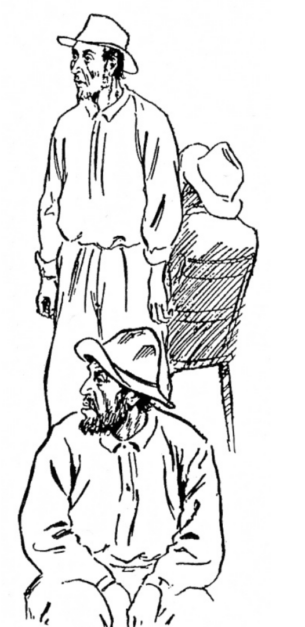
In the eyes of the surgeons, the men who can walk to the station are “well,” though they faint when they get there; if they can get there with the help of one man, they are “well enough to go home,” if they have to be carted there, they are “well enough to try it.” …. Fifty men who should be on stretchers leave Montauk every day…They lie on their backs in the “shack” – maybe four to six hours – until they are warned that it is time to get on the train; then they rise to a sitting posture, and hang one thin arm about the neck of a comrade, who catches them tightly about the waist, rise — after three attempts — and so fight their way to the car, swaying as they go …
BULLY! page 279 / Evening Post.
~~~~~~~~~~~~~~~~~~~~~~~~~~~~~~~~~
The sun has gone down, leaving a broad belt of crimson in the western sky, and the campfires up among the hills begin to glimmer and to burn bright patches in the blackness of the night. A train is just backing into the station, and a company of mustered out men march down and climb aboard, and amid great cheering and loud “Good Byes” from their less lucky comrades, the train pulls out into the west, leaving behind it the camp made up of men from all parts of our great country, who, for the honor of our flag, braved the death-giving climate of the tropics…
BULLY! page 424 / Riverhead News.
————————–
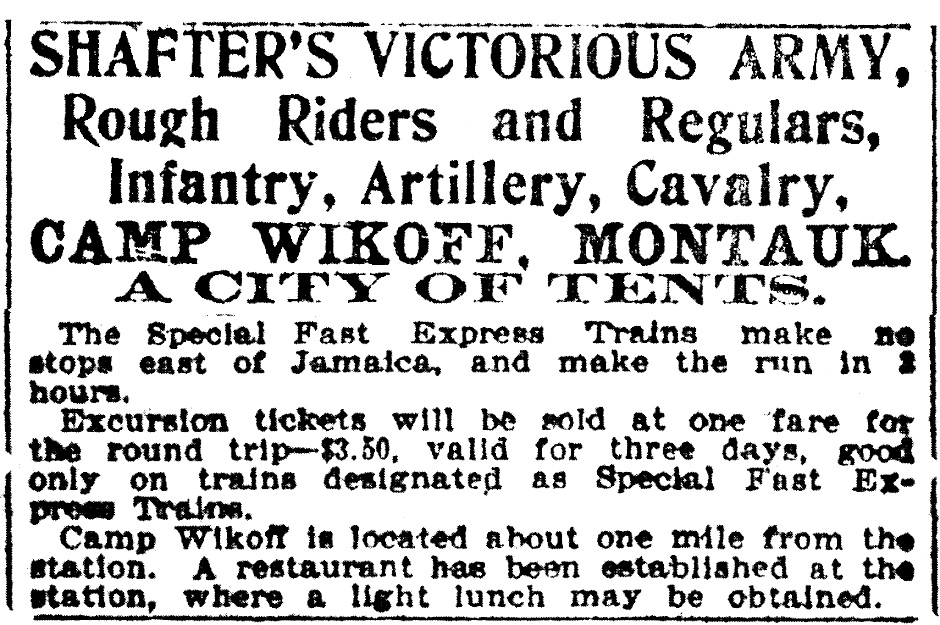
______________________________________________
~~~~~~~~~~~~~~~~~~~~~~~~~~~~~~~~~
Site # 2: Detention Camp (Fort Hill)
Directions: take Flamingo Ave to Fenwick Place, just past Montauk Playhouse,
then to Fort Hill Road (w/ Fort Pond Bay & Railroad Station overlook beyond the Fort Hill Cemetery).
————————–
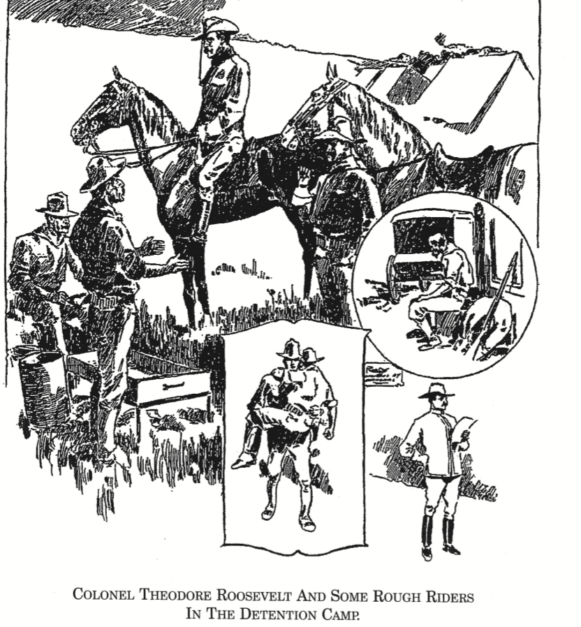
BULLY! page 88 / Chambers, New York Herald.
All returning soldiers spent four-days in the Detention Camp, which had a 250-bed hospital for severe cases of tropical fever — mainly malaria. Those who were well then went to their regimental camps; those who were ill, but not severely ill, went to the General Hospital, where they stayed until well enough to go to their regimental camps.
————————–
A Reporter asked, “How does it feel to get back?”
Replied the cavalryman. “You have no doubt been in a hot, crowded room on a crisp winter’s night–say, where they were receiving election-returns, in a small town, and all the men were smoking, and the stove was red hot and the windows shut, and you have gone from there suddenly into the cold, pure winter air. Well, that is just the difference between here and down there. The feeling of relief is just like that.”
BULLY! page 90 / Evening Post.
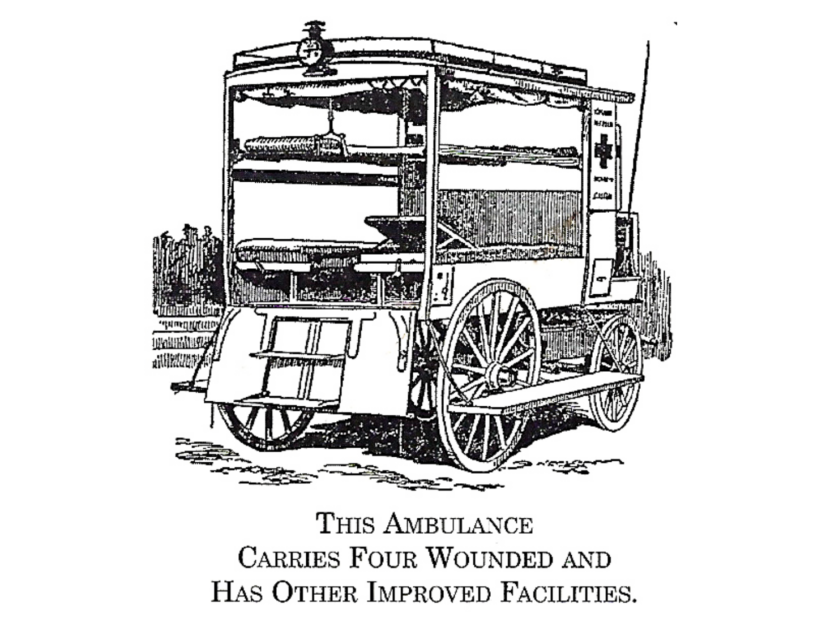
BULLY! page 48 / Washington Post.
______________________________________________
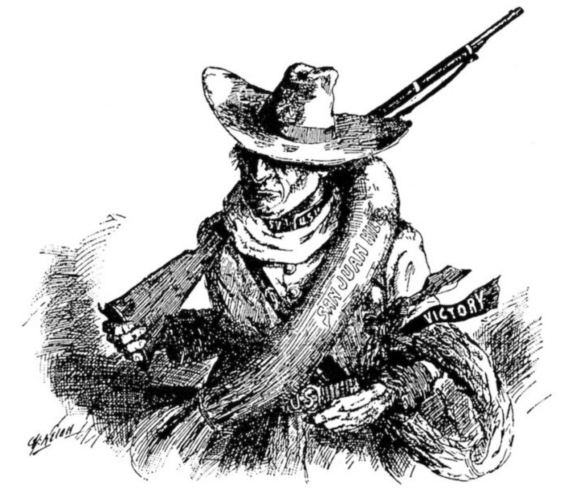
Victor – Victim
BULLY! page 185 / Nelan, New York Herald
————————
Much of the suffering at Camp Wikoff was caused by poor quality canned roast beef
supplied to the troops in Cuba & on the transports.
See Beef Scandal of 1898 / BULLY! pages 526 – 529.
————————
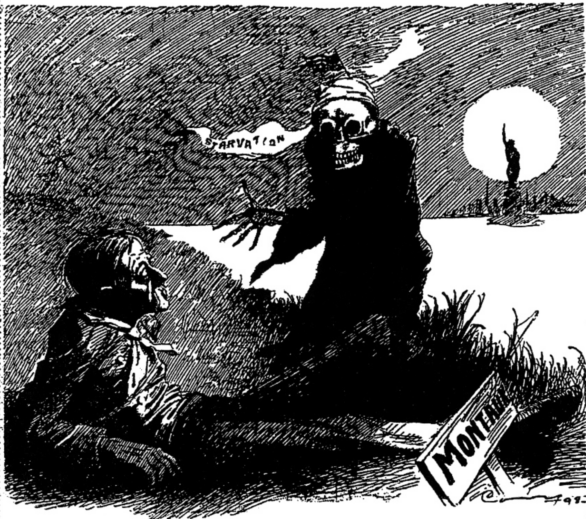
BULLY! page 144 / Cory, The World.
______________________________________________
~~~~~~~~~~~~~~~~~~~~~~~~~~~~~~~~~
Site # 3: General Hospital (Montauk Downs)
Directions: Fort Hill Road to South Essex Street, then left onto South Fairview Avenue
to Montauk Downs State Golf Course.
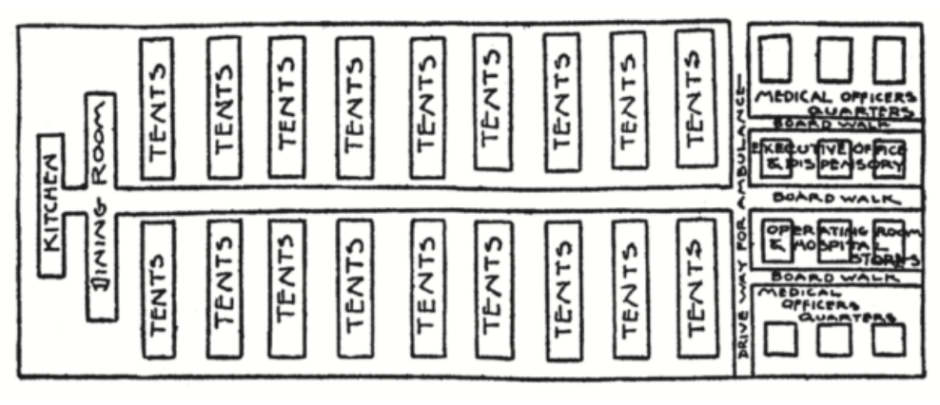
BULLY! page 40 / The World.
The General Hospital will be one of the most complete camp hospitals ever erected. There will be one central covered passageway, and at the sea end of this will be the quarters of the surgeons. Nearby will be the operating tent and the tent for the storage of hospital supplies. From the covered passageway will range sixteen rows of tents containing 500 cots. These rows will admit of extension, and other rows can be added should necessity arise. The chief surgeon does not think that there will be more than 500 cases of sickness that will need constant and unremitting attention….
BULLY! pages 39 – 40 / New York Times.
————————
All the trained hospital nurses were furnished by the American Red Cross to the Government, who signed contracts with them, giving them $ 30 a month and their board.
— Howard Townsend, American Red Cross Field Agent
BULLY! page 532. / Report to the American Red Cross, 1898.
[Note: this was the first time that the US Army contracted with female nurses to serve in Army Hospitals;
service, previously, restricted to male nurses.]
————————
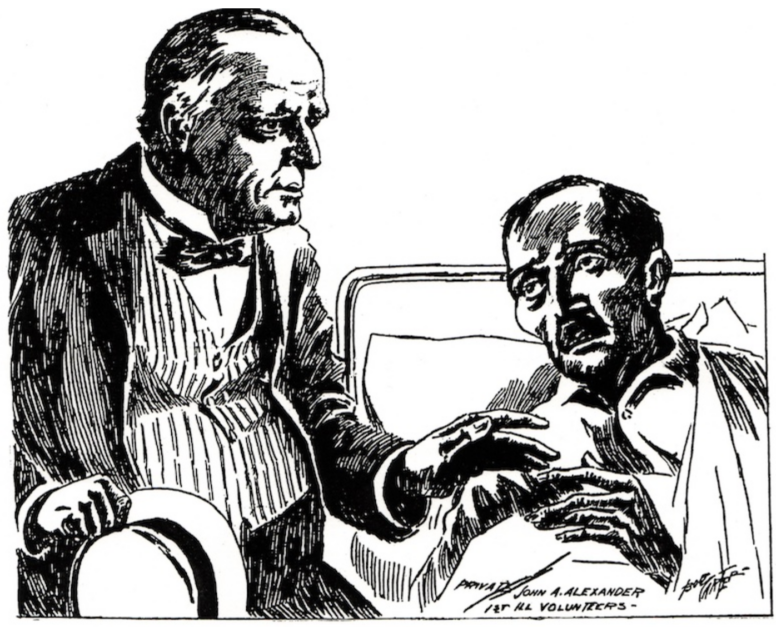
BULLY! page 241 / Carter, The World.
Private John A. Alexander, 1st Illinois Volunteers, Calls on the President to Visit Him.
President William McKinley visited the troops on Saturday, September 3rd,
welcoming them home. He toured the General & Detention Hospitals,
then addressed 5,000 cheering soldiers on
Montauk’s Great Plain.
BULLY! page 241 / The Sun.
———————————-
350+ Soldiers died at Camp Wikoff.
More died at Camp Wikoff than at San Juan Hill.
______________________________________________
~~~~~~~~~~~~~~~~~~~~~~~~~~~~~~~~~
Anecdotes En Route to Third House
———————————-
The Slouch Hat
….the Western love of the slouch hat, the soft, round, limited sombrero, with the broad brim, not too broad — just wide enough to take on beautiful curves bending down under the sun or up before the wind, giving always perfect lines, artistic form…The United States Army never did a more fashionable and practical thing than when it adopted the slouch hat for the rank and file….
BULLY! page 142 / The Sun. Illustrations, New York Press.
———————————-
Cyclists at Camp Wikoff
Cyclists find it rough work to pedal their heels through Camp Wikoff. Expert road riders, who are accustomed to the shortcomings of primitive thoroughfares and who can propel their machines through sandy soil and rutty roadways, get along well enough, but even they must dismount more or less frequently to dodge the flying mule teams which come dashing along with an abandon worthy of the daring laddies who drive them, four or six in hand.
The early morning train took us to Montauk Station…All was activity when we alighted with our wheels. The crowd, the surroundings, the hurriedly erected rough wooden buildings and the blue-shirted military, with the heterogeneous collection of mule-diven vehicles, made us think of Western boom towns. But for the close proximity of Fort Pond Bay, with a half score of transports at anchor, the illusion would have been complete.
There were the lunch room and express room and post office and half a dozen similar shacks, lined alongside and opposite the station and flanked by a freight-yard big enough to accommodate a dozen trains. Between the two rows of buildings runs the main road, and it is the busiest highway on the entire island nowadays…
Were there no other attractive features in Camp Wikoff that road with its kaleidoscopic panorama would be enough to repay the visitor for the trouble he took in getting to the camp. Standing on its high bank and watching the hurrying streams of horsemen and mule drivers, representing every department of the Fifth Army Corps, is like reviewing the best features of Buffalo Bill’s Wild West magnified a thousand times. The surroundings, as well as the performances, are so strange that one can scarcely realize that he is standing on Long Island soil, a little more than 100 miles from New York City….
BULLY! page 189 / New York Press.
~~~~~~~~~~~~~~~~~~~~~~~~~~~~~~~~~
Uncle Sam’s Seaside Park
Every clear hilltop as far as one can see is populated with dozing, basking humanity. Nobody seems to be working; nobody seems to be drilling, or attending to anything but idleness, except far off somewhere a band which is dispensing very excellent music for the benefit of the occupants of this, Uncle Sam’s seaside park.
Camp Wikoff to-day, with the warm, bright sun smiling from the clear light blue of a cloudless September sky, and with the cool salt breeze tempering the warmth, is a Promised Land for every man who is strong enough to get out into the air and stretch himself out on the soft turf.
BULLY! page 271 / The Sun.
______________________________________________
~~~~~~~~~~~~~~~~~~~~~~~~~~~~~~~~~
Site # 4: Third House
———— Third House Nature Center ————
Directions: South Fairview, then right onto Fairview Avenue, then right onto West Lake Drive,
then left onto Route 27 / Main Street or Montauk Point State Parkway, then to Third House on left.
Up to the present the only dwellers on Montauk Point have been the few railroad hands who live in and around the station at Fort Pond Bay; the crew of the Life Saving Station on the south beach; Mr. Conklin and his family, who own and occupy the only inn of the point, known as Third House; and the lighthouse keeper and his family and assistants, at the east end of the point. Some years ago the Montauk Association erected five or six handsome Summer cottages on one of the southern bluffs, but life was found too lonely there, and the cottages have been closed for two summers.
BULLY! page 26 / New York Times.
————————–
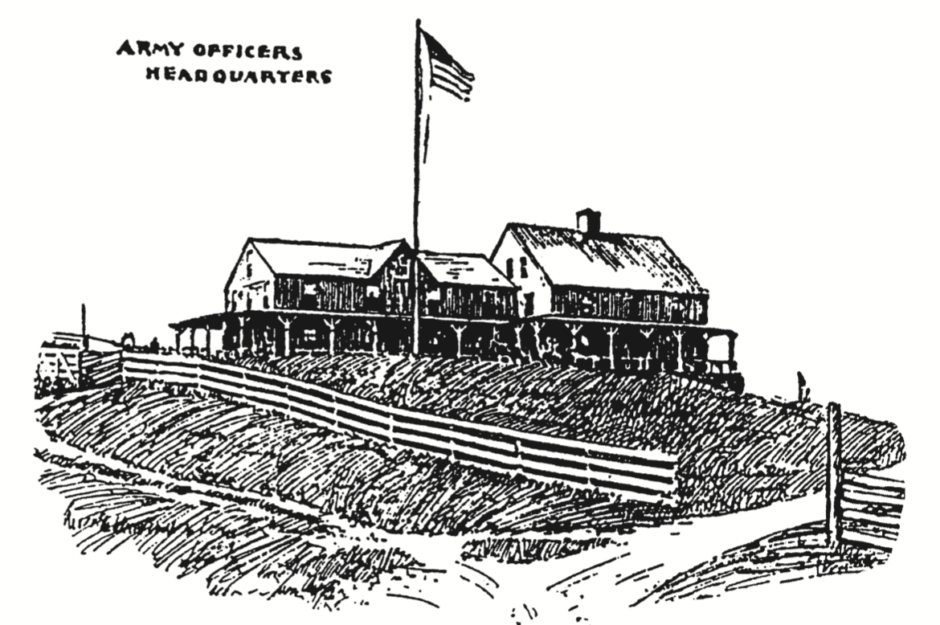
BULLY! page 91 / New York Herald.
Third House
Theodore Roosevelt Slept Here, August 18, 1898.
The Rough Riders who arrived here last Monday were released from the detention camp to-day, although Col. Roosevelt left there last night, and for the first time in a good many weeks slept in what he call a “civilized” bed at the Third House, Montauk.
BULLY! page 91 / New York Times.
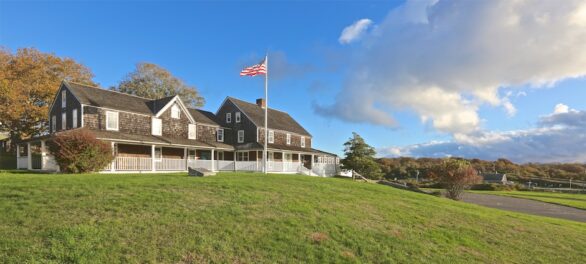
______________________________________________
~~~~~~~~~~~~~~~~~~~~~~~~~~~~~~~~~
Anecdotes En Route to Montauk Light
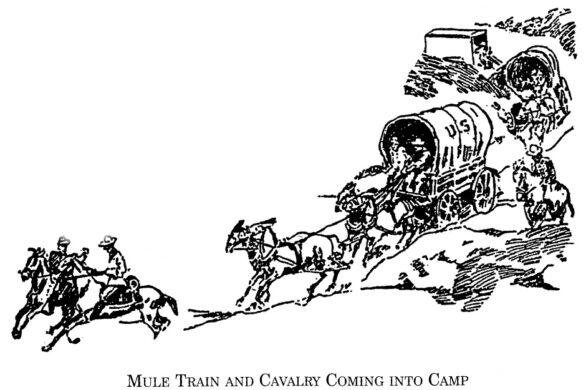
BULLY! page 257 / The World.
The Army Wagon
No man need walk here unless he wants to cut across country. Wherever there is a road he can find an army wagon going his way, and it won’t cost him a cent to ride as far as the wagon is going. All that is required is a brief formality.
“”Give us a lift?” says the pedestrian.
“Jump right in, Buddy,” says the driver, and that is all…
There are hundreds of these vehicles in camp, each regiment having its own outfit, and they go thundering and rattling and banging along the roads at a very lively pace. Before and after train time, the main roadway, suggests nothing so much as an emigrant trail with the caravans racing for Eldorado….Nine out of ten of the army wagons are drawn by army mules…frisky, bright-eyed, self-respecting animals with a gait that makes a horse hustle to keep up with them in the long run….
BULLY! pages 257 – 258 / The Sun.
———————————-
The Camera Fiend
The camera fiend is in camp. Scores of these picture hunters came in on the noon train today. Immediately, they raced for the high points as if the first to snap the shutter would obliterate the landscape…Having once achieved lofty and commanding positions, they proceeded to train their instruments upon everything, animate and inanimate….They poured their withering fire into the newly arrived regiments marching up from the station; they didn’t allow an officer to get past without making him the victim of sharpshooting…There were certain persons whom the camera bearers particularly wished to catch..Gen. Joe Wheeler and Col. Theodore Roosevelt were in most demand…
BULLY! pages 187 – 188 / The Sun.
______________________________________________
Site # 5: Montauk Point Lighthouse
———— OCEANS INSTITUTE ————
Directions: left to the east, Montauk Point State Parkway / Route 27.
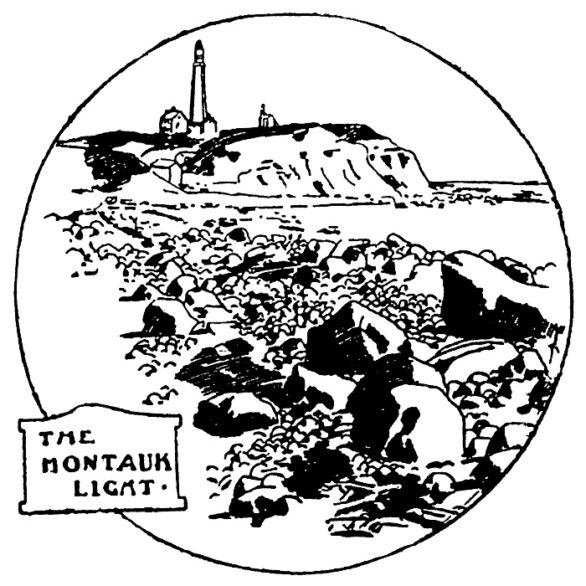
Nobody will miss the soldiers more when this encampment is given up than Capt. James Scott, the keeper of Montauk Point Light…In the twelve years of Capt. Scott’s incumbency he has never had one-tenth so many visitors in a summer at his rather isolated abode as this summer. Every day parties of soldiers walk or ride out there, taking their lunch with them, and are enthusiastically welcomed by the old lighthouse keeper, who shows them all his curios and explains to them the mechanism of the big light, with its speckless glasses…and tells them sea stories of the terrible coast on which so many good ships have left their ribs to bleach in the sun at low tide…
BULLY! page 286 – 287 / The Sun.
—————————-
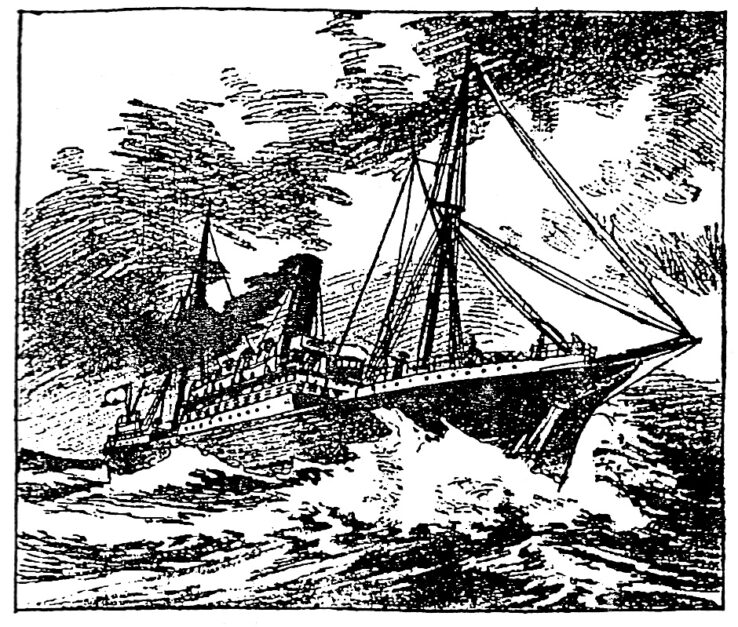
The Transport Allegheny, bound for Montauk, en route from Santiago de Cuba.
60+ soldiers died en route on more than 40 transports, and were buried at sea.
“This ship was not fit to put well men on,” Dr. Magruder said.
“It was hardly less than criminal to load her with sick men. She is a cattle ship…”
BULLY! page 192 – 193/ New York Evening Journal.
———————————
On September 6, 1898, Col. Roosevelt and a few officers visited Montauk Point Light
& signed the log at the lighthouse.

Roosevelt’s Signature & Regiment / Lighthouse Log
——————————
What Air They Get Out Here!”
Everybody says, who visits Montauk Point, “What air they get out here!” Of course they do. Montauk is a mere spit of land running out into the Atlantic deeps, and the wind has to wriggle itself out of shape to get to the end of it without crossing open sea and being cooled…The wind seems to be always blowing, and it comes with a tang of the salt in it, yet strangely and deliciously blended with a wholesome country smell…From the great rolling waves of earth you look out over miles of sea….
Montauk is not so thumping big, geographically, yet its wilderness and seeming bleakness
appear to have no end…
BULLY! page 83-84 / Brooklyn Daily Eagle.
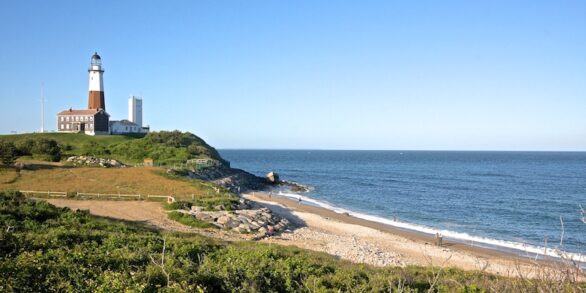
Montauk Point Lighthouse, 2014
______________________________________________
~~~~~~~~~~~~~~~~~~~~~~~~~~~~~~~~~
Directions: Montauk Point State Parkway / Route 27 > Main Street
HEADING WEST
~~~~~~~~~~~~~~~~~~~~~~~~~~~~~~~~~
Site # 6 Third House Re-Visited
———— Third House Nature Center ————
——————
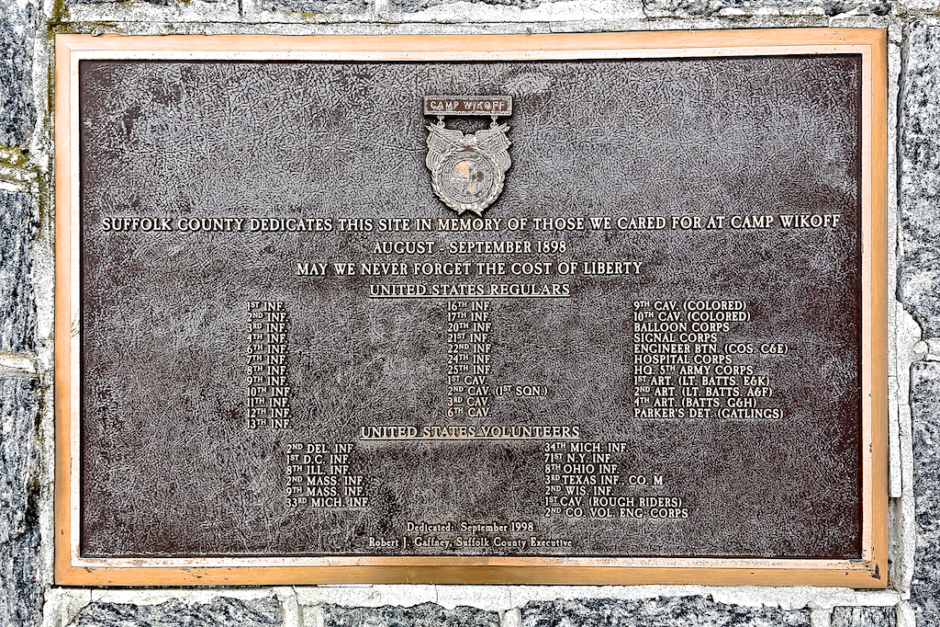
Plaque in front of Third House, dedicated by Suffolk County on the centennial
of the great encampment, 1998.
————————————-
Sunday, September 11th (Oyster Bay)
Dearest Emily, Our visit to Montauk was a great success. Ted & Kermit slept in Theodore’s tent, one on his cot, the other on his air mattress, while poor Theodore occupied the table…Alice, Ethel and I shared a room at 3rd House…We lunched both days at Theodore’s camp & met all his young officers…Some of them took supper up at 3rd House with us. I also went to the hospital to see the sick R.R.’s, so every minute was occupied as we came home after lunch… E.
Edith Roosevelt’s letter to her sister, Emily Carow.
BULLY! page 315.
______________________________________________
~~~~~~~~~~~~~~~~~~~~~~~~~~~~~~~~~
Anecdotes En Route to Ditch Plains
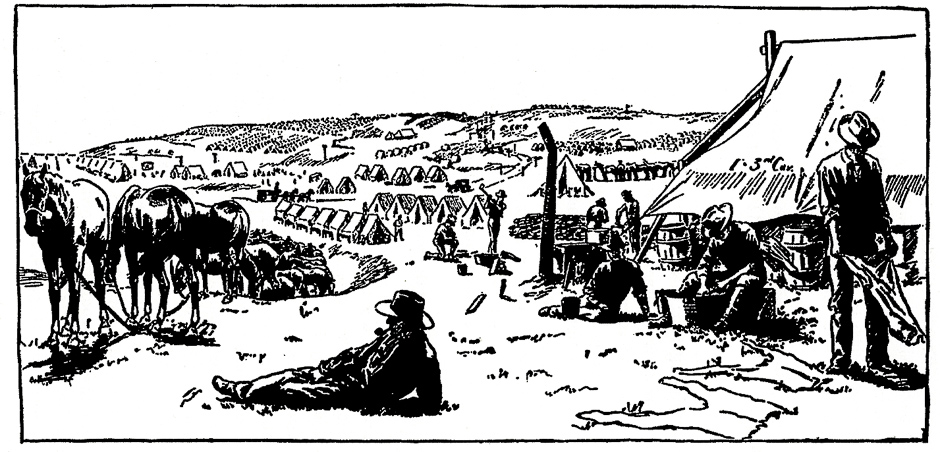
Camp Scene on a Sunday Morning at Camp Wikoff
BULLY! page 260 / W.H. Shindler, New York Herald.
—————————————-
Camp Ghosts
The most pitiable sight that is to be seen hereabouts…is the “ghost” type. The “camp ghost” is the man who isn’t ill enough to be admitted to the hospital, but is too ill to do duty. Therefore he has nothing to do but wander, and he really lacks the strength for that, but he always tries it, with the result that he drops by the wayside and lies there until a jolting army wagon picks him up…
“Such cases,” says one of the surgeons here, “are just about beyond treatment…The cause is the hardships of the Cuban campaign, repeated attacks of fever, and lack of nourishing food at the time when it was needed most. Yet these ‘ghosts’ are not ill in the ordinary meaning of the term. There is no specific ailment. They are simply devitalized….
BULLY! page 165 / The Sun.
————————-
Ocean Bathing
The men are doing very little bathing in the ocean. Probably many of them are still too weak to endure willingly the shock of the first plunge. Then, unfortunately, the beach has got a bad name among the soldiers which it does not deserve. Tales of terrific undertow, that mysterious monster, the sea puss, and holes in the sandy bottom are rife. There is no foundation for these rumors.
The water is delightfully exhilarating, and medical authorities declare that it is the best tonic for the depleted strength of the soldiers.
BULLY! page 167 / The Sun.
————————-
“The Real, Genuine Stuff”
“All the volunteers fought hard,” said a regular cavalry Sergeant the other day, “but those Rough Riders — look at that now, look at those two just riding up there. See how their arms are fixed — just right; and their seat comfortable, deep down in the saddle, and their hats — look at the hats!
Oh, say, they’re the stuff, they are; the real, genuine stuff.”
BULLY! page 142 / Commercial Advertiser.
————————-
A Pure, Far-Reaching Tone
Late every afternoon a masterly blower of the bugle climbs down the cliff to the beach beyond Gen. Wheeler’s headquarters, stands facing the ocean, and perfects himself in the more intricate calls. When the lengthening shadows warn him that soon the other buglers will be blowing the supper call he climbs the cliff, and at the summit, raising his bugle once more, sends the golden notes in peal on peal over the darkening ocean, a good-night song to the sun.
BULLY! pages 319-320 / The Sun.
______________________________________________
~~~~~~~~~~~~~~~~~~~~~~~~~~~~~~~~~
Site # 7: Roosevelt’s Rough Riders
Roadside Stop, Opposite Ditch Plains / Rough Riders Camp (undeveloped)
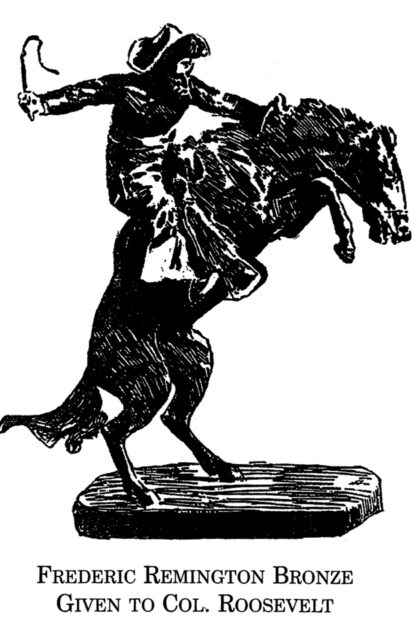
The Bronco Buster by Frederic Remington
BULLY! page 328 / The World.
Colonel Roosevelt’s Farewell to the Rough Riders
I am proud of this regiment beyond measure.
I am proud of it because it is a typical American regiment.
The foundation of the regiment was the cowpuncher,
and we have got him here in bronze….
The men of the West and Southwest, horsemen, riflemen and herders of cattle, have been the backbone of this regiment…Besides the cowpuncher, this regiment contained men from every section of the country, every State in the Union, and because of that we feel proud of it. …It gives me great pleasure to look around among you and see men of every occupation, men of means and men who work with their hands for a livelihood, and at the same time know that I have your for friends. You are men of widely different pursuits, yet you stand here side-by-side, you fought shoulder-to-shoulder. No man asked quarter for himself, and each one went in to show that he was as good as his neighbor. That is the American spirit.
You cannot imagine how proud I am of your friendship and regard….
BULLY! pages 325 – 326 / The Sun.
______________________________________________
~~~~~~~~~~~~~~~~~~~~~~~~~~~~~~~~~
Site # 8: Ditch Plains
Montauk State Parkway > Ditch Plains Road (on the left)
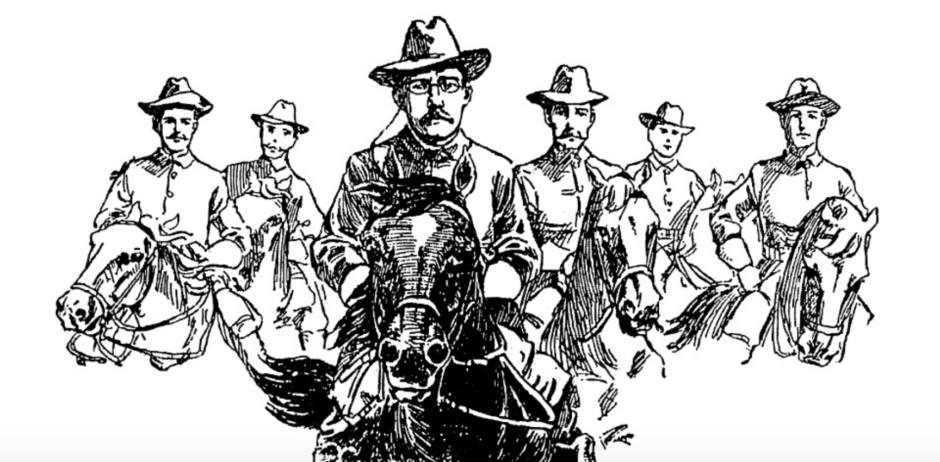
BULLY! page 152 / The World.
There was a thunder of hoofs along the level behind Newspaper Row like the sound of a stampede. Everybody ran out and beheld Col. Theodore Roosevelt on his big horse tearing across the plain at top speed with a squad of Rough Riders in hot pursuit…He ploughed through a marsh, lifted his mount over a gully in a flying leap, sped over the weedy stretch beyond, plunged down five feet to the sand beach, and pulled up close to the water’s edge…Three minutes later the head of Col. Roosevelt could be seen bobbing just outside the line of breakers… Presently a large wave broke out beyond the line, caught the cavalry leader unawares, and he disappeared from the scene of action in a swirl of seething water, to reappear a second later spluttering and laughing.
“Phew! That makes a man feel alive,” he said as he trotted out of the water and dried himself.
A few minutes afterward, he was again leading his squad in a race across the landscape.
BULLY! page 163 / The Sun.
~~~~~~~~~~~~~~~~~~~~~~~~~~~~~~~~~
“This Place…”
Col. Roosevelt stood at the entrance of the mess tent with his head up, his chest expanded, and his powerful arms outstretched, breathing deep of the fresh sea air.
“Oh,” he said with a long sigh of prophetic regret, “I’ll miss this place when it’s all over!”
BULLY! page 319 / The Sun.
______________________________________________
~~~~~~~~~~~~~~~~~~~~~~~~~~~~~~~~~
Site # 9: Shadmoor State Park
Buffalo Soldiers
9th & 10th Cavalry Regiments / Buffalo Soldiers
“I want to say a word more to the cavalry regiments, who occupied the right and left flanks of us at Las Guasimas, the Ninth and Tenth Cavalry regiments. I am sure I speak the sentiments of men and officers in the assemblage when I say that between you and the other cavalry regiments there is a tie which we trust will never be broken.” (Cheers.)
— Col. Roosevelt’s Farewell Address to the Rough Riders
BULLY! pages 325 – 326 / The Sun.
————————-
Black Jack Pershing’s Account of Charge at San Juan Hill
White regiments, black regiments, regulars and Rough Riders, representing the young manhood of the North and the South, fought shoulder to shoulder, unmindful of race or color, unmindful of whether commanded by an ex-Confederate or not, and mindful only of their common duty as Americans.
— Lieut. John Joseph Pershing was in command of the 10th Cavalry, which camped at what is now Shadmoor State Park.
BULLY! page 523 / Under Fire With The Tenth Cavalry.
————————-

“To prevent such suffering in the future, 13 vets of the 17th Infantry Regiment,
which had been at Camp Wikoff, went on to form the American Veterans of Foreign Service
in Columbus, Ohio, a forerunner of the VFW.”
— “Agony of Camp Wikoff” by Vietnam Veteran Gary Turbak,
VFW Magazine, September, 1998.
———————
The troops returning home at Fort Pond Bay that summer were America’s first veterans of a war fought overseas on foreign soil, a seminal event in military history, as American troops liberated a foreign population from colonial rule, enforcing a policy that has continued, through successive military campaigns, to this day.
———————
Camp Paradise
The famous “Fighting Seventh” have their camp along the edge of the ocean cliffs, just west of the Ditch Plains Life Saving Station. It is a glorious place to pitch one’s tent, as the height commands a view of the entire camp and the ocean is so close by. A “strong North-Easter, sea-king, land-waster” would work the very mischief there, and send tents and men flying over the cliffs to destruction…These fellows are, however, delighted with Montauk and call it Camp Paradise.
BULLY! page 311/ The Corrector.
______________________________________________
~~~~~~~~~~~~~~~~~~~~~~~~~~~~~~~~~
Site # 10: Montauk Village
————————
Montauk’s Great Day
———— September 3, 1898 ————
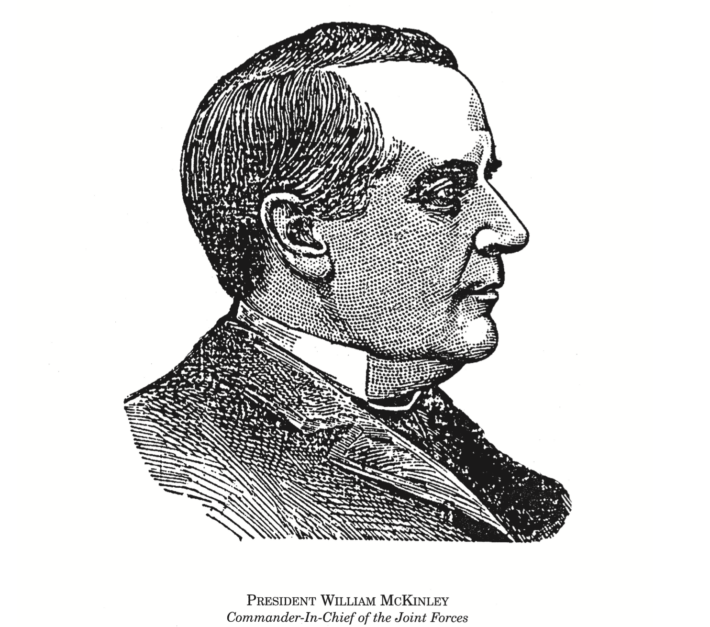
BULLY! page 230 / Boston Globe.
——————
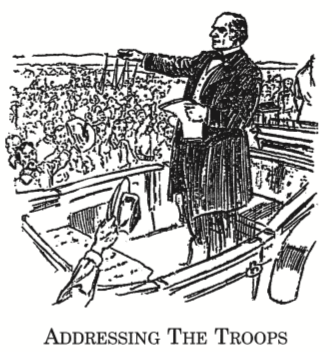
“Gen. Wheeler, Soldiers of Camp Wikoff,
Soldiers of the Fifth Army Corps:
I am glad to meet you. I am honored to meet the brave men who stand before me today. I bring you the gratitude of the nation, to whose history you have added by your valor a new and glorious page…
You had the brunt of the battle on land. You bore yourselves with supreme courage, and your personal bravery, never before excelled anywhere, has won the admiration of your fellow citizens and the genuine respect of all mankind…”
— President William McKinley, addressing troops on Montauk’s Great Plain.
BULLY! page 245 / The Sun / New York Herald illustration.
—————————————
The Presidential Party touring Camp Wikoff under sunny skies that day included President McKinley, Vice President Hobart, Secretary of War Alger and Senator Porter of Vermont.
The Presidential Party paused a moment on a hill, and the President swept with his gaze the wide, undulating cape, whitened on the levels and hilltops by the tents of 18,000 men laid out in geometric lines.
“This is beautiful,” President McKinley said. “I think I never saw a handsomer camp.”
BULLY! Page 237 / New York Times.
—————————————
The two most striking features developed by this war are the heroism of our line
and the sacrifice and devotion to duty of trained women nurses in our hospitals.
— Howard Townsend, American Red Cross Field Agent
BULLY! page 533. / Report to the American Red Cross, 1898.
______________________________________________
~~~~~~~~~~~~~~~~~~~~~~~~~~~~~~~~~
Site # 11: Second House
Directions: From Village Green continue west on Route 27
— Second House is just past Fort Pond.
————
Second House
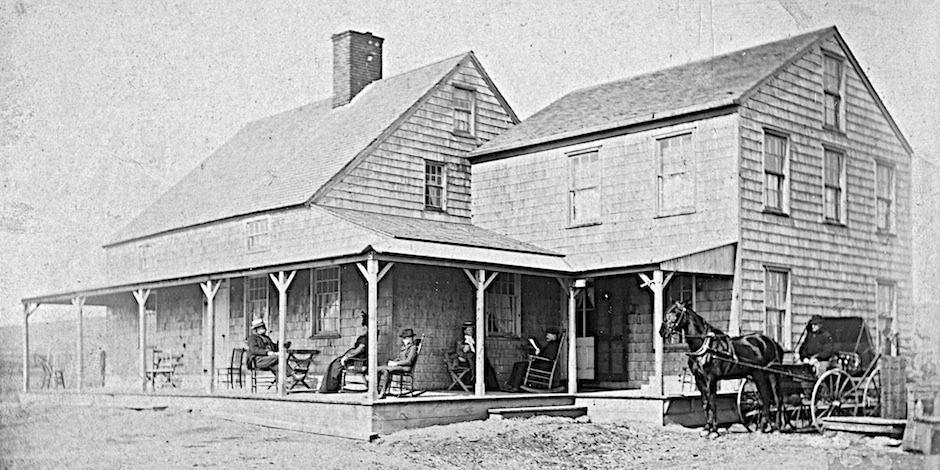
Second House
Until the railroad was carried to within seven or eight miles of the end of the island, this great tract was as lonely as a Nebraska plain. Between Amagansett and the lighthouse there were for years but three permanent habitations, and they were known as the First House, Second House and Third House. The Second and Third Houses are near the camp and have approached the enforced dignity of taverns.
BULLY! page 83 / Brooklyn Daily Eagle.
—————————————
Tales of War
Until a few days ago, you could hardly get a man to talk about Cuba. His memories of suffering there have been too vivid. Now the hardships are beginning to pale in memory, and the triumphs and experiences bought at the price of the accompanying suffering, overshadow them. There will be plenty of those tales handed down to inspire coming generations.
BULLY! page 167 / The Sun.
______________________________________________
~~~~~~~~~~~~~~~~~~~~~~~~~~~~~~~~~

Site # 12: Fort Pond Bay
Directions: take Second House Road north to Navy Road, Fort Pond Bay
On August 14th, the Gate City, the first of the transports from Santiago, arrived…On the 15th came the Miami with Gen. Wheeler, Col. Roosevelt…the Rough Riders and the Third Cavalry. On the same day the St. Louis arrived with the 9th & 10th Infantry and the 71st of New York; the Vigilancia with the 6th and 13th Infantry, and the St. Paul with the 2nd Infantry…This was my first sight of the men from the front and I never in my life have seen so many very sick men together and seemed almost dazed by privation and fever…For the next three weeks everything at Camp Wikoff was at a white heat. Transport after transport arrived, each bringing their thousand or more half-sick men….
— Report of Red Cross Executive Howard Townsend
BULLY! pages 532-533.
—————————
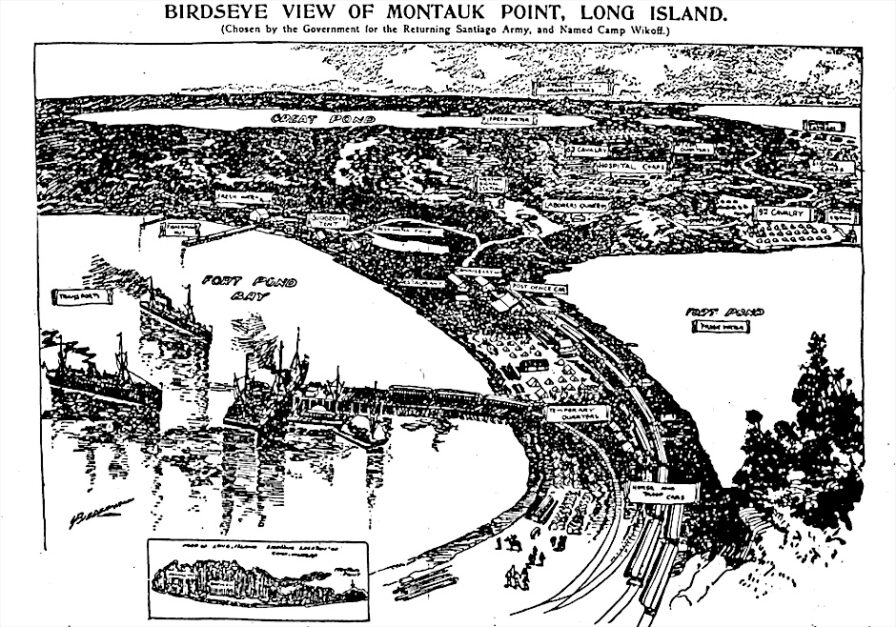
BULLY! page 57 / The World.
————————–
As the Transport Miami neared the dock, someone shouted,
“How are you Colonel Roosevelt?”
Back came the answer in a voice that could be heard half a mile away,
“I am feeling disgracefully well.”
Then, a pause and in tones of intense conviction,
“Oh, but we have had a BULLY fight!”
————————
With their shot-riven colors flying over their ragged and battle stained ranks, the Rough Riders and their gallant brother horsemen of the regular service marched proudly ashore amid the tumultuous cheers of the comrades in arms and of numerous visitors who flocked to the pier to bid them welcome.
BULLY! 62-63 / New York Herald.
———————————
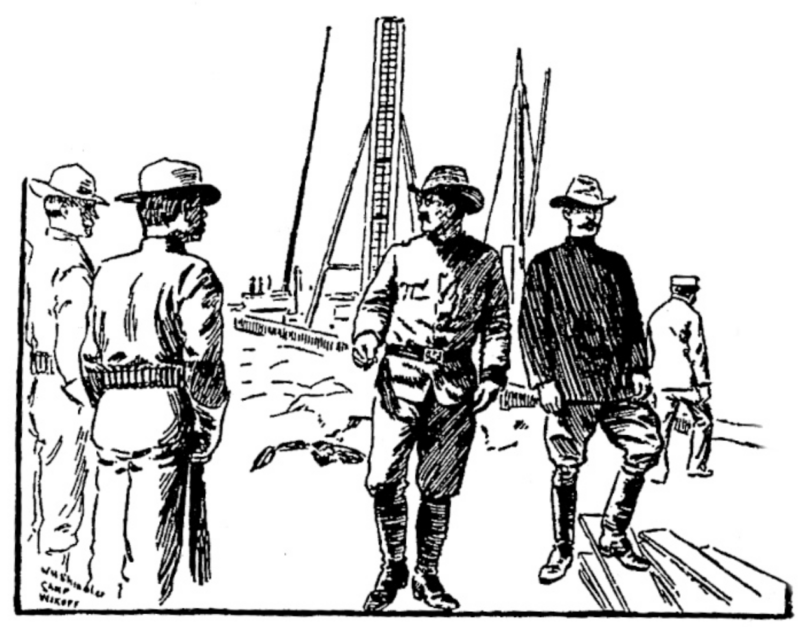
Colonel Theodore Roosevelt & Rough Rider Woodbury Kane
debark August 15th at Fort Pond Bay.
BULLY! page 65 / W.H. Shindler, New York Press.
———————————
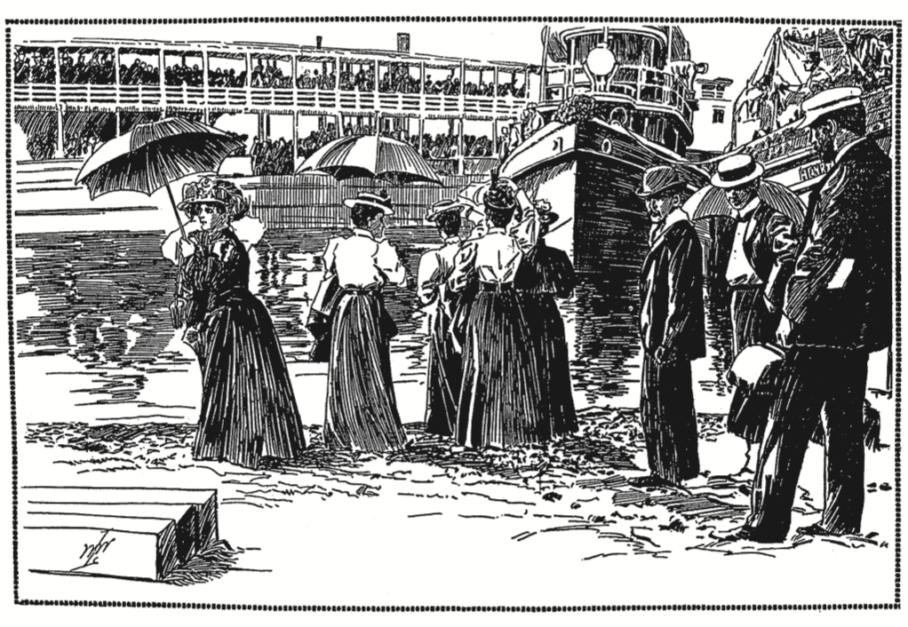
Visitors & Relatives Await the Arrival of the Troops.
BULLY! page 272 / Chicago Tribune.
That summer of 98, thousands came to Montauk by train to see
relatives & friends or just to witness the great encampment.
——————————
“When Camp Wikoff was most populous, there were twenty-eight square miles
of tents, and the scene presented was most beautiful.”
—- Gen. Joseph Wheeler
BULLY! page 421 / New York Times.
______________________________________________
Report of the War Commission
February 13, 1899
On the whole, it may be said that Montauk Point was an ideal place for the isolation of troops who had been exposed to or had yellow fever, and for the recuperation of those greatly debilitated by malarial attacks of marked severity.
BULLY! page 458 / New York Times.
———————
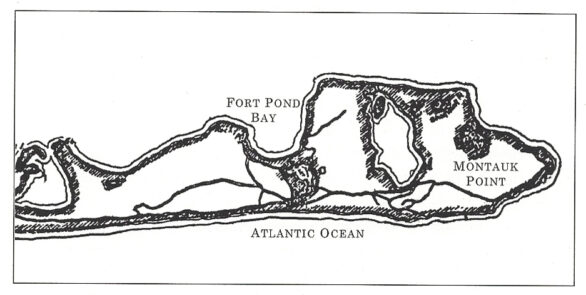
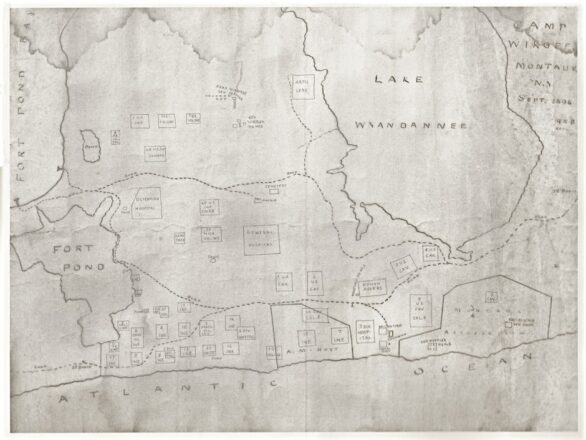
Map of the 4,000 acre camp, drawn September, 1898.
Courtesy of the Montauk Historical Society.
______________________________________________
Return ‘Home’ to Montauk Station via 2nd House Road, left onto Industrial Road to end, then Left onto Edgemere Street, continue onto Flamingo Avenue to Montauk Station on left.
______________________________________________
HOPE YOU ENJOYED THE TOUR!
~~~~~~~~~~~~~~~~~~~~~~~~~~~~~~~~~~~~~
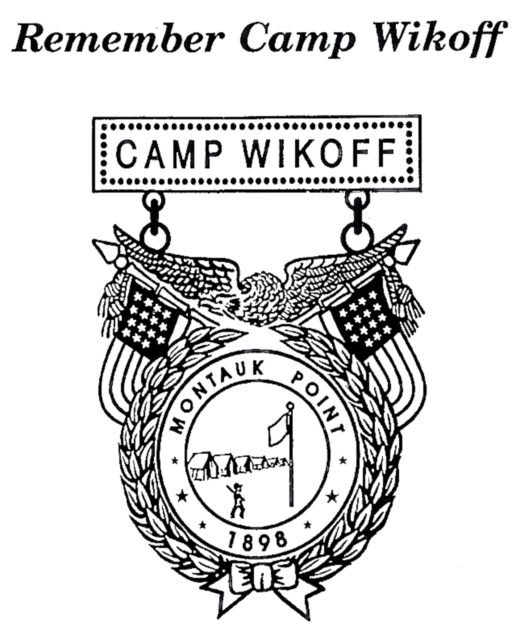
~~~~~~~~~~~~~~~~~~~~~~~~~~~~~~~~~~~~~~~~~~
< A Reversible Tour >
Historic Camp Wikoff Bike Tour created by Jeff Heatley.
© AAQ 2024.
~~~~~~~~~~~~~~~~~~~~~~~~~~~~~~~~~
View ‘Camp Wikoff National Military Park Proposal’ / Link.
~~~~~~~~~~~~~~~~~~~
View: BULLY! Col. Theodore Roosevelt, The Rough Riders
& Camp Wikoff, Montauk — 1898′ | Books on Sale / Link.
——————————
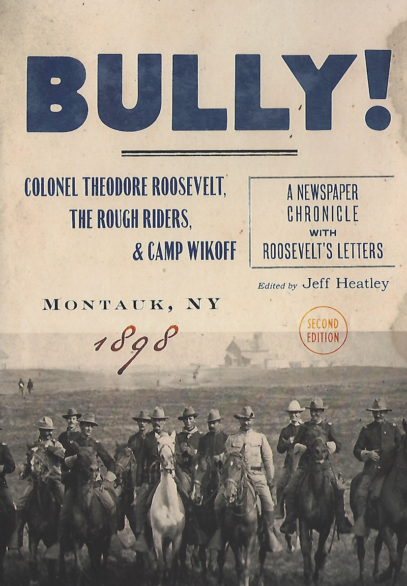
Anecdotes, Reports & Illustrations from BULLY!
BULLY! was Published by Montauk Historical Society and East End Press,
with a Grant from the Gardiner Foundation, 2023
— the 125th Anniversary year of Camp Wikoff.
—————————————

Visit: www.aaqeastend.com
for multiple Camp Wikoff Portfolios
————
AAQ Exclusive Portfolio
____________________________________________________________

